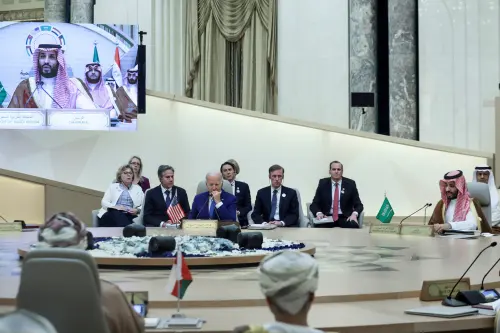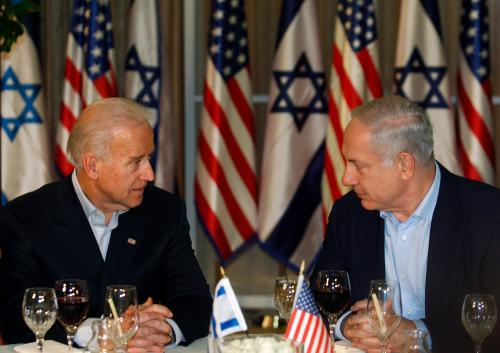Content from the Brookings Doha Center is now archived. In September 2021, after 14 years of impactful partnership, Brookings and the Brookings Doha Center announced that they were ending their affiliation. The Brookings Doha Center is now the Middle East Council on Global Affairs, a separate public policy institution based in Qatar.
For several years, backchannel ties between Israel and some Gulf Arab states have been developing in the shadows. While Israel is not shy about the relationship, the Gulf states have hoped to keep their rapprochement with Israel under wraps for obvious reasons pertaining to the Israeli-Palestinian conflict. Yet increasing diplomatic exposure has brought the relationship out into the open and signaled possible momentum toward the establishment of formal relations for the first time.
After Israeli Prime Minister Benjamin Netanyahu’s official visit to Oman in October—the first for an Israeli head of state since 1996—he has been vocal in his intentions to build on that by solidifying ties with other states, including Bahrain. The Israeli press even reported, citing the prime minister’s office, that Netanyahu intends to formalize relations with Saudi Arabia ahead of the upcoming Israeli elections, which at the time were slated for November.
While this is likely far-fetched, and cannot be separated from political posturing within Israel, in today’s Middle East it is not difficult to discern the reasons why both sides would court each other. Excessive regional instability and mistrust are heightening tensions between states, especially with adversaries like Iran. The region lacks a collective security framework of any kind, and after nearly two decades of war, America’s appetite for further military engagement in the region has waned, leaving open a considerable security vacuum. Salvaging America’s security commitment is at the heart of the Gulf overture to Israel.
It is worth considering, then, the nature of this relationship for both sides, its relative value, and the possible risks it entails, especially for the Gulf states.
Netanyahu’s calculus
Over the course of his long political career, Netanyahu has faced the persistent criticism that his policies vis-à-vis the Palestinians would lead to Israel’s isolation abroad. In order to counter that claim, especially in recent years, Netanyahu has made developing relations with unfriendly states a key component of his foreign policy. Indeed, despite pushing Western Europe further from Israel, the prime minister has achieved a decent level of success in capitals across Eastern Europe, Africa, and Asia—but the Gulf Arab states still remain the holy grail of that effort. If Netanyahu can show that the wealthy countries of the region are willing to normalize relations with Israel despite continued settlement building in the West Bank and no peace on the horizon with Palestinians, then the criticism of Netanyahu holds no water, and he will have been proven right—at least in the medium term. More importantly, Netanyahu will have done it without meaningfully adopting the land-for-peace formula in regards to the Palestinians that has been the basis for Arab-Israeli negotiations since it was developed during the Camp David process in the late 1970s.
Indeed, in a recent meeting with Israeli diplomats, Netanyahu said that the country no longer needed peace with the Palestinians to forge diplomatic ties with the Arab world. “The Arabs are looking for links with the strong,” Netanyahu claimed. “Cultivating strength gives us diplomatic power.”
Just days before, during a press conference, Netanyahu stressed that while other Israeli leaders had tried to bridge the relationship with the Arab and Muslim world through “concessions” to the Palestinians, he had adamantly refused. “We believe in peace out of strength,” Netanyahu countered. “We believe in alliances born out of Israel’s value as a technological, financial, defense, and intelligence powerhouse.”
Netanyahu’s logic follows the Jabotinskian ideological line in which Arab rejection of Israel ultimately breaks against the “iron wall” of Israeli power, from which acceptance of Israel’s place among the nations of the region commences. It is also a direct rebuke to the Arab Peace Initiative that Saudi Arabia spearheaded in 2002, which called for Arab states to normalize relations with Israel in exchange for a return to the 1967 borders and a fair resolution of the Palestinian refugee problem.
A new formula
Today’s rapprochement with Israel by the Gulf states abandons that formula, and rests on three main pillars that have nothing to do with the Palestinians, but certainly affect them.
The first pillar is Iran and the geopolitics of the Middle East after 2011. There is no question that Israel and the Saudi-United Arab Emirates (UAE) axis see eye-to-eye when it comes to their mutual nemesis in the region, which has provided common ground to develop deeper security ties. The Gulf alliance led by Saudi Arabia and the UAE has recognized Israel—the region’s most formidable military and its only nuclear power—as a forceful ally in their own struggle with the threat of Iranian expansionism. For Israel, too, instead of facing off against Iran alone, the Islamic Republic becomes a regional threat, giving Israel more legitimacy in how it responds.
The second reason is the Gulf states’ growing need for sophisticated security and surveillance platforms to police their own populations in the wake of the regional uprisings. Israel’s expertise in this regard, honed during its 51-year occupation of the Palestinian territories, is as sophisticated as it comes. And despite the possibility that Israel has built backdoors into all its systems, and there are other available sellers, some Gulf states have become ready consumers of Israeli technology as a corollary of their newfound ties.
Lastly, and maybe most importantly, for several decades the Gulf states have maintained close ties to Washington based on the mutual interests of maintaining security and stability in the Persian Gulf, and the free flow of oil to global markets. Yet those ties have always been limited by their fundamental transactionalism and the emphasis on building personal relationships with powerful people in Washington as a substitute for lacking broad support among the American public. Moreover, the Gulf states—and Arab states in general—have always been hindered by the distrust of Israel’s ardent supporters in Washington, who are considerably influential on America’s Middle East policy.
While in the past those ties may have felt sufficient, since 9/11—with the Iraq war, the Arab Spring, rising U.S. oil production, the Iran nuclear deal, and the Justice Against Sponsors of Terrorism Act—it has become clear to the Gulf states that their relationship with Washington is uncomfortably tenuous, and their confidence in the United States as a reliable partner and security guarantor has flagged. By positioning themselves as a partner of Israel, the Gulf states are likely hoping to mitigate the opposition in Washington, while reaffirming the U.S. security commitment by linking Israel’s security with their own.
The sticky Palestinian issue
Standing in the way of this convergence, however, are the Palestinians and their intractable conflict with Israel. The Gulf states have always been party to the regional aspect of this conflict, and while they have never really engaged militarily, they have maintained rhetorical, diplomatic, and material support for the Palestinians and an unwavering public rejection of Israel.
Yet in the post-Oslo era, with the Palestinian Authority in a state of precarious accommodation with Israel and the PLO no longer relevant, some of the zeal surrounding the Palestinian cause has faded. Today, there is an impetus to sideline the Palestinians in pursuit of more pressing national interests. Although the Gulf states have been careful not to be too public in their dealings with Israel, they are clearly moving forward under the belief that the Palestinian cause lacks the same traction with their publics, especially the younger generations. This could prove to be a mistake.
Certainly, the Palestinian issue has been overshadowed in recent years by the severe tumult in the region. Moreover, it is difficult for the younger generation of Arabs to identify with an aging and stagnant Palestinian leadership. Yet there is no clear indication that this is a permanent trend. Indeed, given the longstanding durability of the issue, which has remained a top regional priority for more than 70 years, it is more plausible to reason that the phenomenon is contextual and can be reversed if circumstances change. Arab identification with the Palestinians and antagonism with Israel are deeply woven into the cultural and political fabric of society. The Arab states cannot simply abandon this decades-old position without undermining their credibility. Moreover, doing so empowers their regional rivals, Iran and Hezbollah—the very forces they are trying to counter by allying with Israel—as well as domestic opponents, especially radical Sunni Islamists, and even many liberals and pan-Arabists.
While the regional turmoil is likely to remain for the foreseeable future, the stagnation of the Palestinian situation is not. If circumstances change, say in the event of another intifada, and Arab public support for the Palestinians is reinvigorated, the Arab states with ties to Israel risk being caught on the wrong side of a red line they thought had softened and blurred. Consolidating support at home is not just the prerogative of Netanyahu; in the wake of the Arab uprisings of 2011, it is the primary focus of the Gulf states, as well.
That is not to say that a greater degree of regional integration for Israel could not have beneficial side effects, including for the Palestinians. But the possibilities are limitless and hard to predict. What are more certain are the short- to medium-term consequences, which do not augur well for the Arabs. Netanyahu gains something for nothing while reinforcing the notion that he does not need to settle the conflict with the Palestinians to have better relations with the Arab world. The Palestinians lose a key source of leverage vis-à-vis Israel and could find themselves more isolated than ever before. And the Gulf Arab states gain a risky alliance with Israel, without necessarily clinching too much in return that they do not have already by default.
Even closer ties with the United States—the most crucial pillar in this relationship—are far from being a certain outcome. Indeed, in mid-December, on the eve of a U.S. Senate vote to censure Saudi Arabia for the war in Yemen and the killing of Saudi columnist and critic Jamal Khashoggi in Istanbul, Netanyahu offered unprecedented words of support for the Gulf kingdom in the Israeli press, saying Riyadh is critical to global stability, and asserting “the importance of Saudi Arabia and the role it plays in the Middle East.” It had no discernible effect.
Moreover, when it comes to linking their security with Israel’s, the Gulf states should be careful what they wish for. Israel has pushed for years to come under the purview of U.S. Central Command, which oversees U.S. military operations in the Middle East. If such a thing comes to pass, the Arab states risk having their defense needs subsumed by Israel’s unique security lens, something they are sure to regret.
The Brookings Institution is committed to quality, independence, and impact.
We are supported by a diverse array of funders. In line with our values and policies, each Brookings publication represents the sole views of its author(s).






Commentary
What’s behind the relationship between Israel and Arab Gulf states?
January 28, 2019